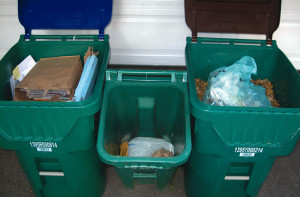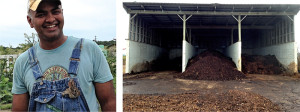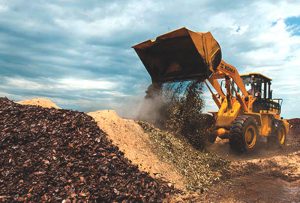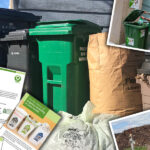BioCycle February 2014
St. Louis Park, Minnesota: Residential Organics Collection Launch
“The St. Louis Park City Council has wanted to start an organics collection program for some time, so when our five-year [waste collection] contract was coming due on October 1st, we added organics to our request for proposals,” says Scott Merkley, St. Louis Park’s Public Works Services Manager. The city also utilized the contract changeover to switch to single stream recycling. In May 2013, City Council approved contracts to collect residential food waste with yard trimmings. All food waste, as well as food-soiled paper and BPI certified compostable products, can be diverted. Advanced Disposal Inc. was selected as the waste hauler, entering into a five-year contract that began on October 1, 2013.
Shannon Hansen, Environmental Specialist for the city of St. Louis Park, says recycling food waste has enabled a number of St. Louis Park residents to reduce the size of their garbage carts by one size, thus reducing their monthly bill for collection. The city has always offered a choice of 90, 60 or 30-gallon carts for garbage collection, but in January, began the option of a 20-gallon cart. According to the city’s most recent tally, 1,100 households have signed up to participate in the organic waste collection program, from a total of 12,300 households that are eligible to participate. St. Louis Park provides weekly pick up of garbage and organics, with recycling on a biweekly basis. Each household receives 220 Bag to Nature“ compostable bags for the organics, in 3- and 13-gallon sizes, free of charge. Residents are encouraged to place the bagged food waste and other organic material in the city-provided carts on top of the yard trimmings. The organics are taken to the Specialized Environmental Technology facility in Rosemount, Minnesota for composting.
So far, the organics program, “…has worked pretty well,” adds Hansen. “A lot of people are really committed to reducing waste and are extremely excited about it. The amount of yard trimmings collected has increased as well.” In the months leading up to the program’s launch in October, St. Louis Park launched an extensive marketing program that included: Three open houses in August; a mailed newsletter; messages on the city’s Facebook and Twitter accounts; and programs on the local cable TV channel. In addition, the organics carts were delivered with informational packets that included photos and text educating citizens on what should and shouldn’t go into the cart.
Santa Fe, New Mexico: Food Waste Collection Pilot
The City of Santa Fe Environmental Services Division, in partnership with Reunity Resources, is launching a pilot food waste collection program. Local restaurants and hotels will be able to contract with Reunity Resources, a nonprofit organization, for collection services. Source separated food scraps will be brought to Payne’s Organic Soil Yard in Santa Fe, which has a yard trimmings composting operation. This compost will then be available for purchase from Payne’s. The new program supports the city’s goal of a zero-waste community. Its Environmental Services Division already provides residential curbside recycling and commercial recycling at reduced rates to encourage and grow the city’s recycling program and boost diversion goals. For the composting pilot, the city will lease 64 gallon green refuse collection bins to Reunity Resources, which in turn will distribute them to participating businesses and provide employee training, and charge a collection fee. All food waste will be accepted.
Fulton, Missouri: Food Waste Composting Enterprise
Ranvinder (Rana) Bains left his family’s dairy farm in India in 2005 to study agriculture in the U.S. He wanted to develop new skills that would help him adapt to farming in the modern age, but was quickly exposed to the high environmental costs of industrialized agriculture in the U.S. After graduating from the University of Missouri-Columbia he ventured to the University of Vermont, where he studied sustainable agriculture. Bains was introduced to the practice of composting, and immediately wanted to learn more. He trained at the Highfields Center for Composting in Vermont, and attended the Maine Compost School. In the summer of 2012, Bains’ enthusiasm turned into a profession when he opened Bluebird Composting in Fulton, Missouri.
The 25-acre facility with a 2-acre composting operation is located 30 miles east of Columbia. It uses a forced air, six-bay aerated static pile system. Two pads house separate compost streams, one that produces certified-organic compost, and a stream that is not certified-organic. Pre and postconsumer food scraps are the primary feedstock for both. Bains mixes in wood chips, sawdust, horse bedding and chicken litter using a front-end loader. Bluebird accepts compostable serviceware and BPI-certified compostable products in its nonorganic compost stream. Material remains in each aerated bay for two months, after which the compost is cured for 90 days. Bioassay testing of the finished product is done on-site. If the product passes this testing, a sample is sent to a number of independent laboratories for analysis. Upon receiving favorable test results, the compost is screened with a McCloskey trommel and either sold or applied to Bains’ vegetable farm. Bains also offers delivery and spreading services, utilizing an Ecolawn compost spreader.
Bluebird Composting operates a collection service for these generators, picking up 45 or 55-gallon totes with a box truck. It services schools, restaurants, college cafeterias, and hospitals. Bains meets with generators to develop a customized recycling plan based upon specific needs of the organization. Variables include the size and number totes used by the institution. Pricing is determined by volume of material, site location, and frequency of collection. Each generator that joins Bluebird’s diversion program receives source separation training. And Bains has the ability to expand. In Missouri, annual permitted capacity is determined by a facility’s acreage, and Bains is not even close to the maximum. In 2014, Bluebird anticipates it will divert over a 1,000 tons of food scraps.
Corrientes, Argentina: Composting Yerba Mate Residuals And Manure
The Establecimiento Las Marías’s (Las Marias) operations in Corrientes include industrial production of yerba mate and tea, forestry (sawmills), and the raising of livestock, all of which generate organic residuals. Until 2009, all this material was either deposited in a foul-smelling dump or, in the case of sawmill waste, burned (only the portion not used in the boilers). This resulted in potential threats to the surrounding water, soil and air. The yerba mate plantation soil is badly degraded because, among other things, little organic material is returned to the soil through the agricultural process. In 2009, Las Marías decided to begin a composting project, which has now grown into a 17-acre windrow composting facility that produces 6,600 to 8,800 dry tons/year of compost, says Dr. Maria Corina Leconte, Agronomical Engineer with Las Marías. “We make use of the waste from our agricultural industries, which we classify as either nitrogen-rich waste from the production of yerba mate, the driers and the feedlot beds, or carbon-rich waste, including the bark and sawdust from the Forestal Las Marías sawmills.”
Once built, the windrows are monitored for temperature and humidity and regularly turned. During the composting process, which lasts about seven months, the heaps lose about 30 percent of their original volume. “Finished compost is applied to yerba mate fields after the plants have been pruned far back in a rejuvenating reduction cut,” adds Leconte. “This makes it possible to enter with a tractor towing a specially-designed distributing machine that operates at a height of about 3 feet off the ground. The compost is distributed at a rate of about 10 tons/acre along the rows of the plantation.” With the amount of compost produced, Las Marias is able to apply compost to 750 to 1,000 acres annually. Las Marías is the leading yerba mate producer in the world, sold under brands such as Taragui, Unión, La Merced and Mañanita.
















